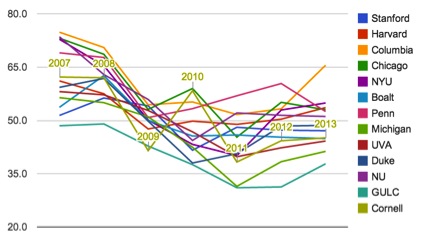What the Recent Increase in LSAT Test-Takers Really Means
- by
- Mar 19, 2014
- LSAT, Number of LSAT Takers
- Reviewed by: Matt Riley


About 200 more people sat for the February LSAT in 2014 than for the February 2013 LSAT. What does this mean? Are law school application numbers on their way to recovery? Probably. Will law school admissions become more competitive? Yup.
Here’s a closer look at the ramifications of the recent increase in LSAT test-takers:
The Legal Market Is Improving
The legal profession, like most others, hasn’t been doing so hot since the 2007 financial crisis. Law firm hiring fell, as did real salaries. Many college graduates responded by not taking the LSAT, and not applying to law school.
However, things are getting better.
The National Law Journal Go-To Law School Rankings track how well law schools place their students among the country’s biggest law firms. By their account, it looks like things are getting better:
Columbia Law School, in particular, had a great year, placing over 65% of its graduates at the nation’s top firms.
Since most legal hiring happens about a year before graduation, the NLJ data gives us a delayed picture. Presently, legal hiring is probably doing even better. When you combine this with the percentage of graduates who won prestigious federal clerkships, and those working at smaller elite boutique firms that fall outside of the NLJ data, things are certainly looking up.
Part of the reason we’re seeing an increase in LSATs administered comes from the recognition that legal hiring is improving, so college graduates are starting to come back to law school.
Other Considerations
There are other reasons for the increase in February LSAT test-takers.
First, law schools are more likely now than in the past to count an applicant’s highest LSAT score versus taking the average. This will naturally lead to more LSAT retakes, and so more LSATs will be administered.
Second, many law schools, including Harvard, are extending their application deadlines so that a February LSAT score will arrive in time for the current application cycle. Some law schools will even accept a June LSAT score.
Third, with law school applications down, law schools have started throwing around a lot more scholarship money. This gives applicants another incentive to retake the LSAT. Why settle for getting in at your target law school when you could get some money too?
The Future
We’re seeing the first signs of a recovery in law school applications. It’ll still be a few years until we’re back up to the numbers we saw in 2010, but law school admissions is about to get tougher. Soon you’ll need a higher LSAT score to be competitive at your ideal law schools, but the good news is that you’ll be more likely to get a job.
Search the Blog

Free LSAT Practice Account
Sign up for a free Blueprint LSAT account and get access to a free trial of the Self-Paced Course and a free practice LSAT with a detailed score report, mind-blowing analytics, and explanatory videos.
Learn More
Popular Posts
-
logic games Game Over: LSAC Says Farewell to Logic Games
-
General LSAT Advice How to Get a 180 on the LSAT
-
Entertainment Revisiting Elle's LSAT Journey from Legally Blonde









